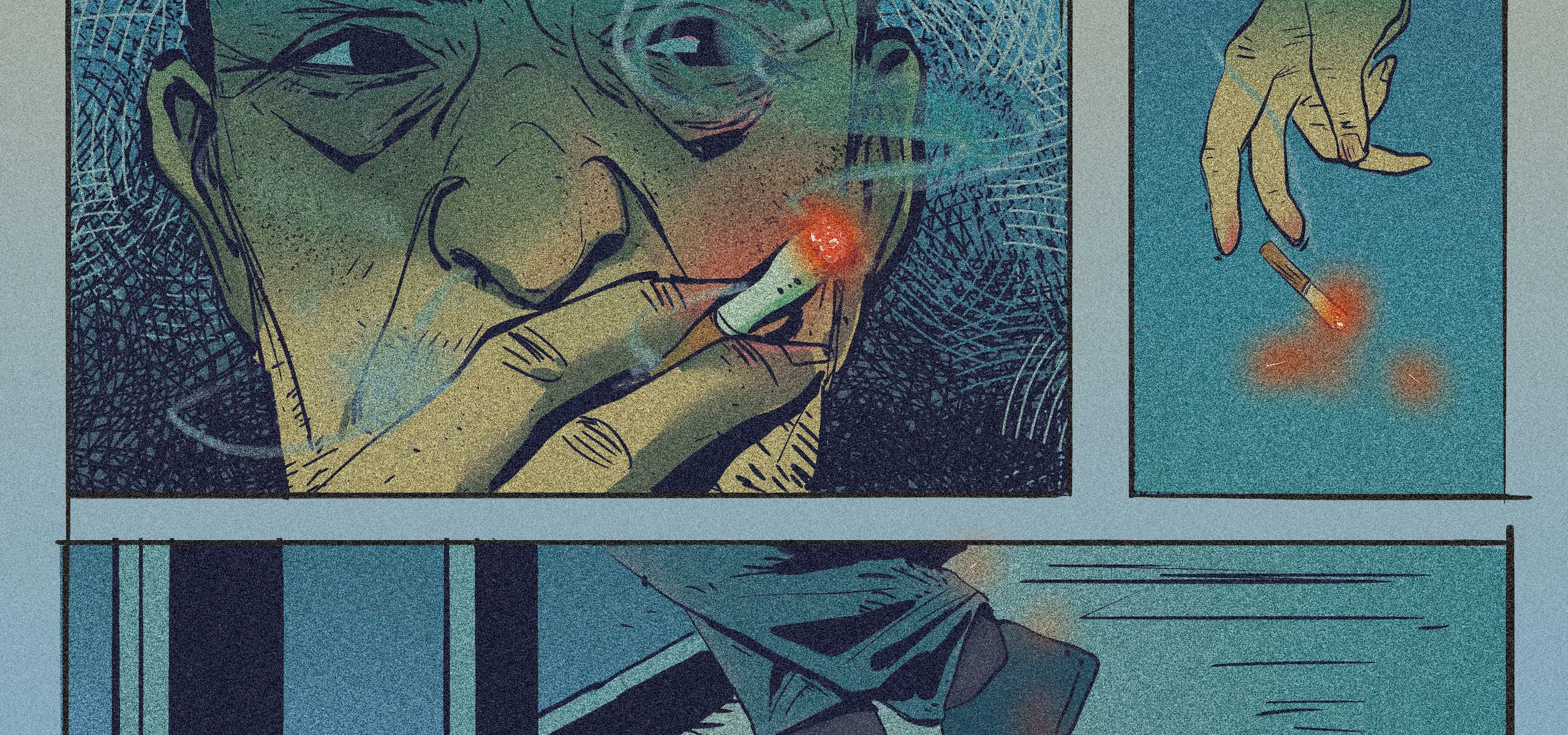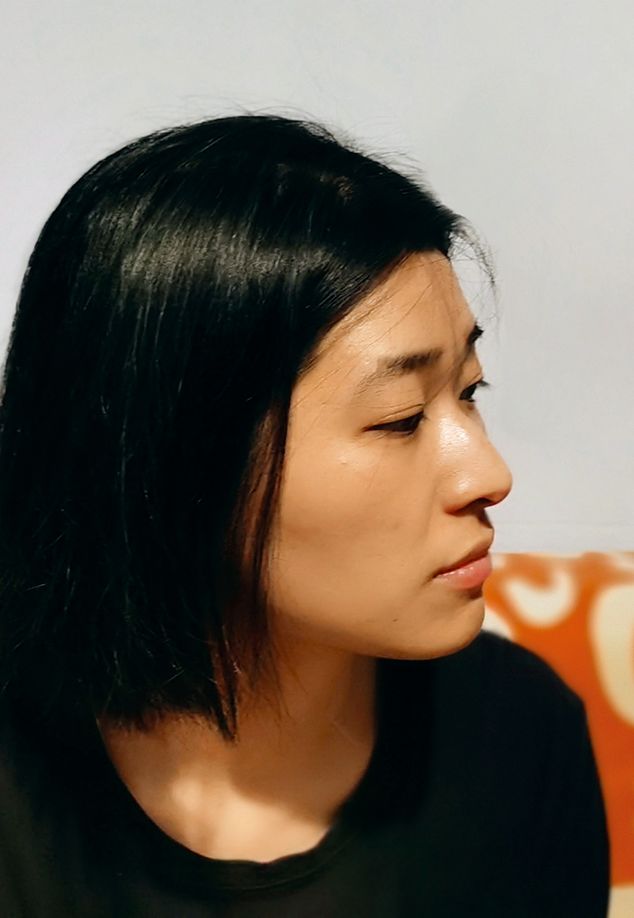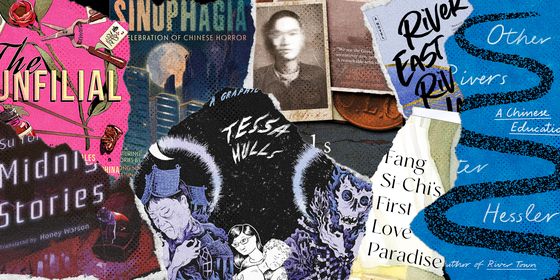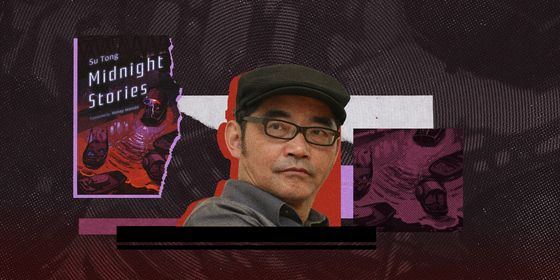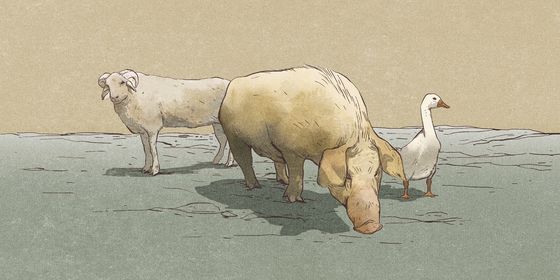Read a newly translated short story from writer Hu Yuesheng
“Check!”
The crisp sound of the chess pieces on the board echoed up into the leaves of the poplar tree. There was a tap and a slide, and another soldier fell. The player whose General was in danger straightened his back. He had broken out in a cold sweat. He stared at the pieces on the board, noting their position, studying the peeling lacquer.
He knew that he had lost but he wasn’t willing to resign the game. He was a veteran of these games in the park. In this world, he was a venerable General. When men get up in years, their worlds shrink, as if they are returning to childhood. Children compete for modest prizes like a bouquet of plastic flowers; old men compete for dignity and honor. That’s why he wasn’t willing to resign the game. He held his breath and continued silently studying the board. His ears were turning red from frustration.
“Forget it,” the man across from him said. “It’s just a game.” The man stood up. “We all made promises when we were young. How many fell by the wayside?”
“My word is my bond,” the veteran said. “I never break a promise.”
“Is that right? So you still remember what you promised way back then?”
At those words, the veteran seemed to be waking up from a dream. But by the time he lifted his head, his opponent was gone, and the flock of people that had gathered to watch their game were fluttering away.
He decided to take a stroll through the supermarket. There was one beside the park. He went in and bought a bottle of shaojiu wine and two packs of salted peanuts. Auntie Liu was working the register. She recognized him. As she scanned the items, she asked him, “Are you expecting company today?” When he shook his head, Auntie Liu glanced up at his face. “Are you drinking alone?”
“That’s right,” he said. “Drinking alone.”
Auntie Liu clucked her tongue. “I thought you’d quit,” she said. “What happened? Is your liver alright now?”
“Same as before,” he said. “I don’t think it’s going to get much better.” He pointed at the selection of cigarettes behind her and said, “Get me a pack of the Hongtashan, too.”
She rolled her eyes. “If you’re going to drink, might as well smoke, too, huh?”
As he walked out, he gently swung the plastic bag in his hand. He was feeling something that he hadn’t felt in a long time. He couldn’t remember how long ago it had been, whether he was in his late teens or early 20s when he started, but he often used to make the same walk, carrying the same cargo of cigarettes and liquor. His father had been an officer in the military and his family had done alright for themselves, but he went in another direction. He hung out with the young punks in the neighborhood, using whatever cash or ration tickets he could scrounge up to buy cigarettes and liquor. They would smoke themselves stupid and drink themselves blind. After that, there wasn’t much left to do but beat each other bloody. He had grown up in a military compound, so he was used to getting slapped around. When it came to fighting the neighborhood goons, there weren’t many that could best him.
One of his challengers turned out to be a bit unusual. He had come ready to fight, for no apparent reason. The veteran had beaten him up. The challenger had run off. And a few days later, he was back again. The veteran beat him up and the same cycle repeated itself. The challenger was getting better and better. Finally, it happened: The challenger came and fought him to a stalemate. They were both evenly matched. Neither would back down. They kept fighting for more than an hour. In the end, both of them were bleeding. They fell to the ground, too exhausted to move.
The veteran was lying flat on his back. He reached into his jacket pocket and pulled out a cigarette. It’d been crushed to a pulp. He threw it over and it landed on the challenger’s face. He told the challenger that he amused him: Even though he’d been beaten up, he kept coming back, never giving up. He asked him what the point was.
The challenger laughed. He put the cigarette in his lips. That’s where he kept it, never even bothering to light it. He told the veteran that he wanted to find a worthy adversary. He wanted to do more than just trade blows. He wanted to trade his life. The challenger said that most people go through life without much purpose. The only way to live authentically was to take your life into your own hands and stake everything on it.
The veteran felt the same way.
The challenger told him that was why he had kept coming back.
The veteran laughed. “You must be out of your mind,” he said. But he admitted that it was a rare thing—a person who thought this way. There can only be one sun in the sky and one tiger on the mountain. A person like that, the world would only permit one of their kind. The day would come when the winner of their contest was decided. The veteran had laughed, as if he found the whole thing funny, yet he was serious. He reached into his pocket and pulled out the battered, bloody pack of cigarettes. He ripped off a shred and wrote: “Fifteenth. Night. Same place.”
“You wrote it down,” the challenger said, “so don’t forget it.”
The veteran held up the scrap of paper. “My word is my bond,” he said. “I never break a promise.”
He wrote it down and he did not forget it, but he was unable to make the appointment. On the night of the 15th, with a full moon rising above them, the Red Guards showed up at his door and dragged away his father. He stood in the doorway for a long time. He felt as if he were standing on a beach as the tide swept in. He looked out into the darkness. The water was rising. By the time he came to his senses, the water was already at his chest. He tried to swim back through the door but it was too late. The red waves crashed down on his head. The sky above was blotted out. There was no way to outrun the waves. That night, he was caught in the flood of history. He tumbled in the waves, cut off from everyone around him.
He put the bottle of liquor down on his old writing desk with a thump. He heard his wife frying something in the kitchen. The hot vegetable oil skittering around the edge of the pan made a sizzling sound. The old familiar smell filled his nostrils.
He went out into the courtyard and watered his flowers. He fell into a trance, waving his hose back and forth over the oleander and azaleas. The flower pot was soon full. The water ran over the rim. He went to feed his canary. He called her name, “Sister Qiao!” She hopped around in her cage as he poured more food into her dish. “Wife,” he called inside, “don’t forget: The flowers have to be watered twice a day, once in the morning and once at night. You need to feed Sister Qiao when her bowl is empty, and wash her cage. She needs her water changed at least once a day.”
The sound of rattling crockery and pans came from the kitchen. “Those are your flowers,” said the old woman, “and that’s your bird. What are you telling me for?”
“Don’t forget,” he said. “And don’t worry about anything else.”
He went back into his house. From the drawer in the writing desk, he took out a tin box. He opened it up and took out a crumpled shred of paper. Time had yellowed it. He looked at what was written on it. He took a slug of the shaojiu and felt it burn in his chest. Tears came to his eyes. He fixed his hair in his reflection in the window. “Where did my coat go?” he called to his wife.
“It’s in the closet. Way in the back. Are you going out?”
“I’ve got something to do tonight,” he said.
“Don’t you want dinner?” his wife asked.
“I’m fine. I’ve got something to do tonight.”
He heard the sound of the pan being dropped into the sink. It echoed like the crash of thunder. “Huh,” his wife grunted, “you could have told me before I went through the trouble of making it. You never change. I should have realized it a long time ago. I must have been blind to have chosen you.”
He took his jacket out of the closet and tucked the pack of Hongtashan into the pocket. “You weren’t blind,” he told his wife. “I always loved you.”
He stood at the edge of the river, feeling the autumn breeze. He lit a cigarette and looked up at the moon. Images flicked across his eyes, as if he were flipping through a photo album. Some of the photographs were familiar and some not. They were yellowed, curling at the edges...
He remembered that there had once been a factory on the other side of the river. It was gone. A park had replaced it. There was a shopping mall beside it. When he was young, there had been a sorghum field there. On the side of the river where the veteran stood, there was no reinforcing bank, no parkland, and no concrete. The ground was covered in gravel. It wasn’t a beautiful place. Back in the day, he remembered, there were not many cars. Having a bike meant that you came from a wealthy family. He used to ride a Phoenix. He remembered riding along this river, a Hongtashan in his lips, feeling the envious gaze of everyone he passed.
Of course, not everyone liked him. He knew there were people that wrote him off as a spoiled brat, the rotten son of a good family. If his father hadn’t been an officer in the military, they said, there’s no way a kid like him would get away with pushing his luck like that. Without a good family behind him, a kid like him could’ve ended up with a bullet in the head. He knew what they said. It pissed him off. He couldn’t prove them wrong but he didn’t want to admit it. He couldn’t ignore it, either. Those words had haunted the veteran—until he met the challenger. The challenger knew what was in his heart. They had lain together beside the river, all bruised and cut, stained red by the setting sun. They had cursed each other. Not a part of their bodies was spared from injury.
The veteran dropped his cigarette and stamped it out. The butt joined many others that had collected there.
He reached into his jacket for the pack. He weighed it in his hand. It was the last cigarette. He pulled his hand back out of the pocket. There were footsteps approaching. They were slow. They were familiar. They didn’t sound like the footsteps of a young man.
“My word is my bond. I never break a promise.”
He brushed off his sleeves and lifted his head. The moon above was full.
Author’s Note: These stories are inspired by a conversation I had with my friend, a devoted lover of wuxia stories. He was very disappointed at the decline of contemporary wuxia literature, and claimed that the romance of the martial underworld is forever gone. But I believe that the spirit of the swordsmen never dies. I think such a sentiment is built-in among people with a Chinese cultural background. Even when it is shrouded in the mist of history, hidden in the concrete jungle, or submerged in everyday life, there will always be people missing the swordsmen who were free to love and hate; and there will always be people who continue the legend of the jianghu in their own ways.
Hu Yuesheng 胡月生
Born in Shaoxing, Zhejiang province, in 1992, Hu Yuesheng works as an urban and rural planner by day. She describes herself as in love with the city, the countryside, and the people who live on this land. Hu writes short stories and draws comics, and has published two short story collections, Goodbye, Jianghu (《再见江湖》) and A Flash Back of How We Got Married (《关于结婚的一场倒叙》), on the digital publishing platform Douban.
Night Moves | Fiction is a story from our issue, “Lessons For Life.” To read the entire issue, become a subscriber and receive the full magazine.





